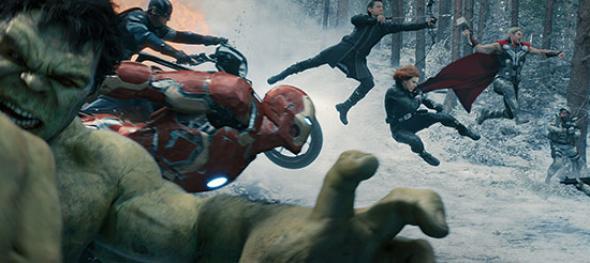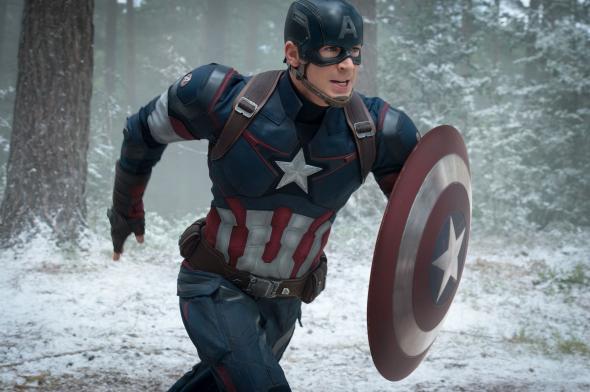This is the dawning of the Age of Ultron—the age in which I plan to breathe deep and just let superhero movies be what they are, rather than stressing out about what their burger chain–like sameness might have to say about the state of American cinema. Or world cinema. Or, for that matter, the whole global economy with its interlinked chains of production and consumption, entertainment and marketing, all converging in the year’s first Marvel blockbuster, Avengers: Age of Ultron, which arrives this week in the U.S. with more than $200 million in foreign box office already in the bank, accompanied by a whirling red-and-silver cyclone of fast food tie-ins and product placements and Disney interactive exhibits. (See how not stressed out I am already?)
If Age of Ultron is a chain hamburger, it’s one turned out by a maker who cares deeply about the integrity of his product. Joss Whedon, who helmed the wildly successful first Avengers in 2012, could be thought of as the Danny Meyer of franchise movie production. And Age of Ultron does light up, a few times every hour (of which there are nearly 2½), with the bright, clever dialogue and attention to intimate human exchanges proper to Whedon’s genre-shifting TV series over the past two decades—not to mention the very different other film he directed in 2012, an effervescent, no-budget Much Ado About Nothing shot in Whedon’s backyard. A starkly sad profile that recently went up on BuzzFeed makes clear Whedon’s deep knowledge of and commitment to the Marvel comic book universe—and also the grinding corporate and artistic pressures that, for now at least, have led him to feel finished with his work at the studio. Other filmmakers—the brothers Joe and Anthony Russo, who made the latest Captain America movie—have committed to co-direct the upcoming two-part installment, Avengers: Infinity War (you’re telling me).
Age of Ultron, then, shows what happens when an unstoppable force (Joss Whedon’s imagination) meets an immovable object (the Disney/Marvel behemoth). And the result is, indeed, paradoxical: a crashy, overlong, FX-driven blockbuster that’s capable of morphing, Hulk-to-Banner style, into a loose-limbed ensemble comedy about collaboration, flirtation, and friendship. At least until the next threat to the universe raises its artificially intelligent robotic head and the boom-boom-smash starts up again.
I can’t say it wasn’t a pleasure to re-encounter the charismatic gallery of principal players, whom we first come upon in the midst of an assault on a fortress in the fictional country of Sokovia. In a long, unbroken traveling shot—if concepts like “unbroken,” “traveling,” or “shot” have any meaning in the post-Gravity age of digital cinematography—every major Avenger gets opportunities to showcase his or her villain-whomping specialty. Steve “Captain America” Rogers (Chris Evans) deflects bullets and bad guys alike with his pleasingly chunky super-shield. Thor (Chris Hemsworth)—he just goes by the one name, because he’s the Norse god Thor—gets creative with his all-powerful space hammer. Bruce “the Hulk” Banner (Mark Ruffalo) overcomes his moral aversion to violence to get in some old-school, green-fisted smashing. Master archer Clint “Hawkeye” Barton (Jeremy Renner) pulls out his trusty quiver and goes full Errol Flynn on the enemy’s ass before sustaining a wound that takes him out of the battle. Natasha “Black Widow” Romanoff (Scarlett Johansson) just sort of … fights really well, I guess, with martial-arts kicks and flips that demonstrate the surprising stretch factor of what looks like an uncomfortably snug black leather catsuit. And Tony Stark (Robert Downey Jr.) flies over the whole proceedings in his Iron Man exoskeleton, issuing warnings, directives, and words of encouragement to his colleagues like an airborne life coach.

Courtesy of Marvel
The fortress they’re raiding hides the secret headquarters of Hydra, the retro-Nazi organization led by Baron Wolfgang von Strucker (Thomas Kretschmann). The gang makes short work of Hydra HQ, but they neglect to capture two of Strucker’s latest human weapons: the super-twins Pietro Maximoff, aka Quicksilver (Aaron Taylor-Johnson) and Wanda Maximoff, aka the Scarlet Witch (Elizabeth Olsen), who as children lost their parents to a weapon manufactured by Stark Industries and have since sworn revenge on both Stark and his fellow Avengers.
If all those characters’ proper names, their super-alter-egos’ names, and the names of the actors who play them are already starting to blur into one long word string (Silverhawk Downey-Johanssworth von Ruffaloff?), perhaps you should go boil some water for tea, because there are more names to come. Samuel L. Jackson plays the Avengers’ cranky, eyepatch-sporting former commander Nick Fury. James Spader (via voice over and motion capture) is the nihilistic artificial intelligence–program–turned–world menacer known as Ultron. Anthony Mackie is the winged do-gooder Sam “The Falcon” Wilson. Paul Bettany (who has for years been voicing Iron Man’s polite computer helpmate J.A.R.V.I.S.) shows up late in the film as a floating, eggplant-hued thingamabob known only as the Vision. Plus, in roles of (as far as I can tell) a superpowerless nature, there are Stellan Skarsgard, Linda Cardellini, Julie Delpy, Andy Serkis, and others.
Age of Ultron couldn’t be more crammed with weapons-grade acting talent. And though the movie often feels as if its writing and its filmmaking are in opposition to each other—that Whedon is trying to sneak in more character development and incidental humor than the form’s strictly proscribed structure will allow—nearly every major character gets at least one good scene, and a few minor ones do, too.
That’s the added value you get from hiring a talent like Whedon (though the mere words added value, with their prioritization of the profit margin over individual auteurship, again remind us that it’s Disney, not the director, that wields the final say in corporate productions at this scale). As a true comics fan who’s also a keen observer of human nature, Whedon is capable of writing dialogue that reminds us of what’s not just stereotypical but archetypical about these overfamiliar characters. Men who turn green and giant when they’re angry. Women who shoot mind-controlling forcefields out of their fingertips. A World War II soldier who was frozen for 80 years against his will and wound up outliving everyone he ever loved. Scientific believability be damned, these are rich character conflicts to explore—a simple truth comic books seem able to communicate more powerfully than their filmed offspring, especially as the latter become ever more beholden to global consumer demand.
When they get a minute or two off from cosmos-saving, Whedon’s Avengers seem more like misfit drama majors than brooding demigods. They’re ruefully conscious of their own celebrity/freak status and the way their enhanced abilities have deprived them of normal personal lives. A languid early party sequence in which we start to get a sense of the gang’s competitive bonding rituals gets interrupted far too soon by a would-be world-destroyer, but I, for one, would have been up for at least 10 more minutes of cocktails and banter. A will-they-or-won’t-they? romance plot between Banner and Natasha, which at first seems contrived, quickly gets pretty steamy, and not just because one postshower scene affords a welcome glimpse of the unshaven chest that once led a friend and I to dub the actor “Ruffalo, the Fluffy Buffalo.” And as the long-suffering pregnant wife of the arrow-wielding Hawkeye, Linda Cardellini gets, and delivers perfectly, the best line in a film replete with good ones: “You know I totally support your avenging.”
I’ve heard some critics wondering whether the laugh that line got (a big one, at my screening) was intentional or not. All I can say is, those who doubt it was must never have watched an episode of Buffy the Vampire Slayer. I’ve only seen a few myself, but enough to tell that that show’s unique tone has to do with the way it confidently mixes deft genre tribute with earnest emotional engagement. That’s the kind of delicate brushwork that can easily get lost on this big a canvas. I’m glad Whedon got to achieve his childhood dream of becoming a creative force in the Marvel comic universe that’s long been dear to him, and I hope he socked away enough money while doing so to pursue many more dream projects in the future. But as Avengers: Age of Ultron lumbered toward its generic, sequel-teasing conclusion, I wanted to cheer on its creator’s decision to flee the franchise the way one embattled Avenger, late in the film, exhorts an imperiled Sokovian boy to make his escape: by pointing in the direction of the rescue vessels waiting to evacuate the city and shouting, “Run! Run!”
